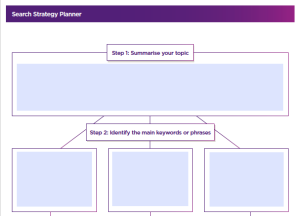3. Finding information
With so much information available, how do you know where to start?
Consider your information needs
Think about the types of information you need and where you can search for them. You might need definitions, background information, statistical data, government reports, case studies, or academic research. Also consider any specific requirements set in your assessment task. You may have been asked to use scholarly or academic sources or maybe primary or secondary sources. Information needs will vary depending on the task and the depth and breadth of your response.
Search strategies
One of the most important things to do when looking for information for your assignment is to plan your search. There are often alternative words and phrases that you can use to find further sources about the same topic. Planning your search terms and phrases will retrieve more relevant results.
 Watch our video on Topic analysis for an introduction to creating a search strategy.
Watch our video on Topic analysis for an introduction to creating a search strategy.
You may like to follow a process such as the SKILL technique to plan your search:
- Summarise your topic
- Select your keywords
- Identify synonyms and alternative keywords
- Link your keywords and phrases (e.g. with AND, OR and NOT)
- Locate and evaluate your results
A search strategy planner document, example below, may be helpful:
![]() Using the Search strategy planner (PDF, 22.5kb) plan a search for the question ‘Discuss the rise of media representations of the Australian white ibis in modern Australia’.
Using the Search strategy planner (PDF, 22.5kb) plan a search for the question ‘Discuss the rise of media representations of the Australian white ibis in modern Australia’.

When you’ve finished, compare it to our version of the search strategy (PDF, 29kb).
When applying your search strategy in tools such as Journal Databases you may be able to use special punctuation or “syntax” to refine your search further. Brackets () can be used to logically group together your query. Quotation marks “” can be used to ensure all search results contain a specific word or phrase. An asterisk can be used to search for permutations of a word, so, for example, comput* would give results for computers, computation, computing etc.
Searching the Library
The Library gives you access to a wide range of resources including books and journal articles, in print and electronically. Primo Search, the Library’s discovery tool, is a great place to find online information. Primo Search is also available on the Library homepage.
![]() Watch our Primo Search video (YouTube, 1m07s) for a quick introduction to searching for resources.
Watch our Primo Search video (YouTube, 1m07s) for a quick introduction to searching for resources.
You will be presented with a log in option when you run a search in Primo Search. We recommend you log in to quickly access the full text of any online resources.
For physical items, Primo Search will show the location, call number, and availability.
Databases
You might not find everything that you need in Primo Search. You may want to use multidisciplinary and subject-specific databases when you need to search precisely or comprehensively.
Databases are high quality and subject specific online information-retrieval systems. Using databases will find journal articles and other publication types, such as books, theses, newspapers, videos and images. Although accessed over the internet, databases are not traditional websites and many require logins to use.
The Databases link under Research Tools and Techniques on the Library homepage lists multidisciplinary and subject-specific databases. Use the ‘Databases by category’ to browse for your subject area. You can also find information on relevant databases in the Subject Guides for your subject area.
![]() Watch Searching in a database ? (YouTube, 3m55s).
Watch Searching in a database ? (YouTube, 3m55s).
Searching databases
Before you start, it’s always a good idea to plan your search strategy. At this stage, ensure that you choose the right database, and carefully select your keywords. Limiting your search to the article title or abstract fields will help retrieve a smaller number of relevant articles.
![]() Watch our Get better search results (3m34s) video for some handy tips.
Watch our Get better search results (3m34s) video for some handy tips.
Searching by subject
Many of Charles Sturt’s databases also have their own subject-specific thesaurus which can help you find information within that database using subject concepts rather than keywords. Examples of databases that contain a thesaurus:
- The medical database PubMed uses MeSH.
- The education database ERIC uses a thesaurus.
- The business journal database Business Source Complete.
Check the Help feature within the database or for further information Contact the library team.

